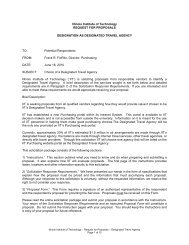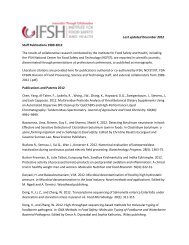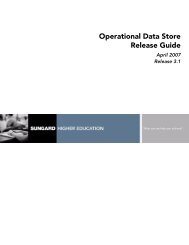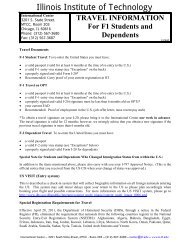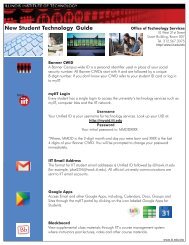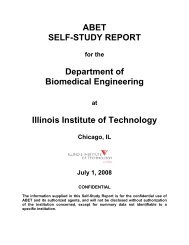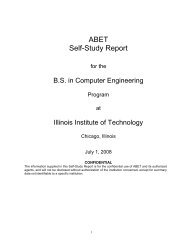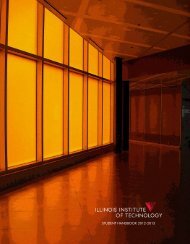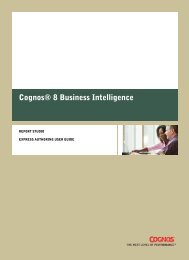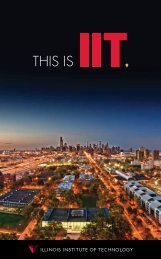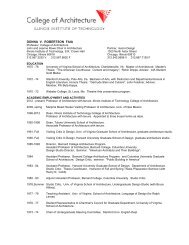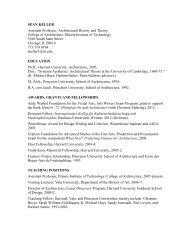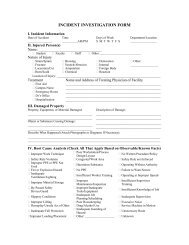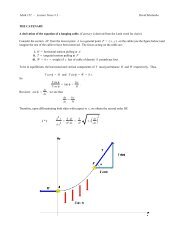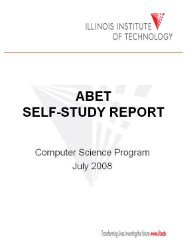Copyright & Disclaimer Information - Illinois Institute of Technology
Copyright & Disclaimer Information - Illinois Institute of Technology
Copyright & Disclaimer Information - Illinois Institute of Technology
Create successful ePaper yourself
Turn your PDF publications into a flip-book with our unique Google optimized e-Paper software.
Course Descriptions<br />
HIST 380<br />
The Origins <strong>of</strong> Modern Science<br />
An examination <strong>of</strong> the pr<strong>of</strong>ound<br />
change in our conception <strong>of</strong> the natural<br />
world from Copernicus (1500 A.D.)<br />
to Newton (1700 A.D.); how the adoption<br />
<strong>of</strong> experimentation, quantification<br />
and new instruments created a new<br />
conception <strong>of</strong> scientific method; and<br />
the goals and nature <strong>of</strong> scientific<br />
knowledge. Prerequisites: A 100-level<br />
humanities course and satisfaction<br />
<strong>of</strong> IIT’s Basic Writing Pr<strong>of</strong>iciency<br />
Requirement. (3-0-3) (H) (C)<br />
HIST 381<br />
Science in Industrial Society:<br />
1750-1900<br />
The transformation <strong>of</strong> the physical<br />
and biological sciences from the<br />
Enlightenment to the 20th Century<br />
and its effects on culture, politics<br />
and belief; the creation <strong>of</strong> science-based<br />
technologies and the creation <strong>of</strong> the<br />
pr<strong>of</strong>ession <strong>of</strong> scientist. Prerequisites:<br />
ENGL 101, HUM 102 or equivalents;<br />
a 100-level humanities course; and<br />
satisfaction <strong>of</strong> IIT’s Basic Writing<br />
Pr<strong>of</strong>iciency Requirement. (3-0-3)<br />
(H) (C)<br />
HIST 382<br />
<strong>Technology</strong> in History: 1500-1850<br />
Explores the process <strong>of</strong> technological<br />
change during the birth <strong>of</strong> industrial<br />
societies. Considers the context <strong>of</strong> early<br />
industrial development in Europe, then<br />
examines the industrial revolution in<br />
Britain and America. Concludes by<br />
assessing technology’s role in European<br />
domination <strong>of</strong> Asia and Africa.<br />
Prerequisites: A 100-level humanities<br />
course and satisfaction <strong>of</strong> IIT’s Basic<br />
Writing Pr<strong>of</strong>iciency Requirement.<br />
(3-0-3) (H) (C)<br />
HIST 383<br />
<strong>Technology</strong> in History:<br />
1850 to Present<br />
Examines technological change as a<br />
characteristic activity <strong>of</strong> modern societies.<br />
Investigates the science-based “second”<br />
Industrial Revolution in Europe and<br />
America. Explores the varied responses<br />
<strong>of</strong> artists, writers, architects and philosophers<br />
to the machine age. Concludes<br />
by discussing technology’s place in the<br />
modem nation-state. Prerequisites:<br />
A 100-level humanities course and<br />
<strong>Copyright</strong> & <strong>Disclaimer</strong> <strong>Information</strong>: <strong>Copyright</strong> © 1994, 1995, 1996, 1997, 1998, 1999, 2000, 2001, 2002, 2003, 2004, 2005, 2006, 2007. CollegeSource®, Inc. and Career Guidance Foundation. CollegeSource® digital catalogs are derivative works owned and copyrighted by CollegeSource®, Inc. and Career Guidance Foundation. Catalog content is owned and copyrighted by the appropriate school. While CollegeSource®, Inc. and Career Guidance Foundation provides information as a service to the public, copyright is retained on all digital catalogs.<br />
<strong>Copyright</strong> & <strong>Disclaimer</strong> <strong>Information</strong>: <strong>Copyright</strong> © 1994, 1995, 1996, 1997, 1998, 1999, 2000, 2001, 2002, 2003, 2004, 2005, 2006, 2007. CollegeSource®, Inc. and Career Guidance Foundation. CollegeSource® digital catalogs are derivative works owned and copyrighted by CollegeSource®, Inc. and Career Guidance Foundation. Catalog content is owned and copyrighted by the appropriate school. While CollegeSource®, Inc. and Career Guidance Foundation provides information as a service to the public, copyright is retained on all digital catalogs.<br />
satisfaction <strong>of</strong> IIT’s Basic Writing<br />
Pr<strong>of</strong>iciency Requirement. (3-0-3)<br />
(H) (C)<br />
HIST 384<br />
Science in the Twentieth Century<br />
Development <strong>of</strong> quantum theory, relativity<br />
and molecular biology; the growth<br />
<strong>of</strong> science to its present important position<br />
in government, economic life and<br />
technological development. Prerequisites<br />
A 100-level humanities course and<br />
satisfaction <strong>of</strong> IIT’s Basic Writing<br />
Pr<strong>of</strong>iciency Requirement. (3-0-3)<br />
(H) (C)<br />
HIST 491<br />
Independent Reading and Research<br />
For advanced students. Prerequisite:<br />
Consent <strong>of</strong> department. (Credit:<br />
Variable) (H) (C)<br />
Humanities<br />
HUM 102<br />
Industrial Culture<br />
An interdisciplinary course that<br />
examines the development <strong>of</strong> modern<br />
industrial society and the impact <strong>of</strong><br />
science and technology on our culture.<br />
Readings drawn from history, literature<br />
and philosophy. (3-0-3) (H)(C)<br />
HUM 104<br />
Age <strong>of</strong> Darwin<br />
An introduction to the humanities<br />
through an investigation <strong>of</strong> important<br />
changes in our culture associated with<br />
Darwin’s theory <strong>of</strong> evolution. Readings<br />
drawn from literature, philosophy and<br />
science. (3-0-3) (H) (C)<br />
HUM 106<br />
Life Stories<br />
An interdisciplinary study <strong>of</strong> autobiographies,<br />
written chiefly by Americans.<br />
The syllabus varies, but may include<br />
Benjamin Franklin, Harriet Jacobs,<br />
Maya Angelou, Malcolm X, Langston<br />
Hughes, Richard Rodriguez, Thomas<br />
Merton, Frank Lloyd Wright and Judy<br />
Chicago. In addition to considering<br />
autobiography as a genre, the course<br />
examines the historical events and the<br />
philosophical issues that have shaped<br />
the lives and attitudes <strong>of</strong> these writers.<br />
(3-0-3) (H) (C)<br />
IIT Undergraduate Bulletin 1999-2001<br />
HUM 315<br />
Creativity in Art, Science<br />
and <strong>Technology</strong><br />
An exploration <strong>of</strong> processes <strong>of</strong> creative<br />
thinking and action across the fields <strong>of</strong><br />
art, science and technology. The course<br />
examines creative cognitive styles, creativity<br />
in individuals, and the dynamics<br />
<strong>of</strong> creative groups. It aims to discover<br />
patterns <strong>of</strong> thought or techniques that<br />
can enhance creativity. Emphasis is on<br />
student projects. Prerequisites: A 100level<br />
humanities course and satisfaction<br />
<strong>of</strong> IIT’s Basic Writing Pr<strong>of</strong>iciency<br />
Requirement. (3-0-3) (H) (C)<br />
Interpr<strong>of</strong>essional Projects<br />
IPRO 297, 397, 497<br />
Interpr<strong>of</strong>essional projects allow students<br />
to learn teamwork, leadership and project<br />
management skills while working<br />
in multidisciplinary teams on projects<br />
involving technical, ethical, environmental,<br />
economic, public policy and<br />
legal issues. IPRO project teams are<br />
typically comprised <strong>of</strong> six to 10<br />
students from sophomore through<br />
graduate level and from all disciplines,<br />
who can broadly contribute to a project<br />
effort. While every effort will be made<br />
to accommodate students’ first choices,<br />
it may be necessary to balance students<br />
across all projects scheduled for the<br />
semester or to consolidate students into<br />
fewer projects to meet minimum team<br />
requirements. Specific rules about selection<br />
<strong>of</strong> IPRO projects may apply in<br />
certain degree programs. Some projects<br />
may carry humanities or social sciences<br />
credit. Students must consult the lead<br />
faculty member for the project and<br />
their faculty adviser before registering<br />
for a project. (1-6-3) (C)<br />
Mathematics<br />
* This course does not count for<br />
graduation in any engineering, mathematics,<br />
natural science or computer<br />
science degree program<br />
MATH 119*<br />
Geometry for Architects<br />
Basic analytic geometry in two and<br />
three dimensions; trigonometry.<br />
Equations <strong>of</strong> lines, circles and conic<br />
sections; resolution <strong>of</strong> triangles; polar



